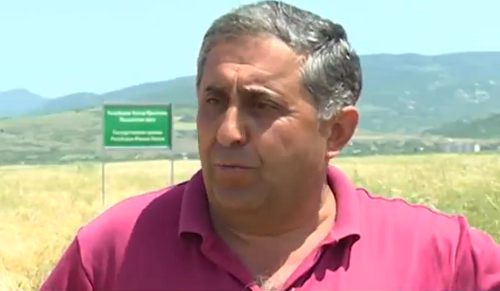| Tbilisi Says Russian Troops Seize Farmlands Adjacent to South Ossetia |
| Civil Georgia, Tbilisi / 5 Jul.'17 / 16:16 |

Gia Khodeli stands in front of the newly-erected green border sign cutting the farmer from his agricultural land, July 4, 2017. Photo: screengrab from Trialeti TV
Georgian officials expressed fury over the media reports that Russian FSB troops advanced few hundred meters deeper into the Tbilisi-controlled territory in the area of Bershueti village, Gori district, as a result of which farmland of a local resident fell under the Russian-controlled territory.
On July 4, Georgian media reported that Russian troops installed a new green “state border sign” in Bershueti, moving the Administrative Boundary Line (ABL) several hundred meters inwards from its previous location, cutting Gia Khodeli, local resident, from his agricultural lands.
Speaking to reporters, Khodeli explained that the sign was erected about 700 meters deeper into the Georgian-controlled area and as a result he will no longer be able to use 20 hectares of his cultivated land.
In a statement on July 4, the Ministry of Foreign Affairs of Georgia expressed “its deep concern over the illegal installation of a so-called border sign across the occupation line in the Tskhinvali Region,” and pledged to use “all levers at its disposal” not to let “the aforesaid action of Russia remain without due international assessment and reaction.”
“This is a continuation of the illegal process of the so-called borderization, which not only restricts the fundamental rights of local residents but considerably damages the security situation on the ground and obstructs Georgia’s efforts to achieve peaceful resolution of the conflict,” the Ministry said.
The State Security Service of Georgia confirmed the reports in a brief statement on July 4, saying that “the illegal installation of the so called border marking banner on the occupation line,” left several agricultural plots “partially beyond the occupation line.”
“This is a continuation of the illegal process of borderization, which not only restricts the fundamental rights of local population, but directly harms security on the ground,” it said, adding that the issue “will definitely be raised” at the Ergneti Incident Prevention and Response Mechanism (IPRM) meeting on July 11.
Similar messages were voiced by the administration of the President of Georgia, who expressed concern about “the inward movement of the occupation line” and vowed to inform the international community on the development. “It is crucially important that we condemn every instance of the infringement on Georgia’s sovereignty. Georgia will use all diplomatic instruments at its disposal to counter the creeping occupation,” President Margvelashvili’s Foreign Affairs Secretary Tengiz Pkhaladze noted.
Georgia’s State Minister for Reconciliation Ketevan Tsikhelashvili commented on the matter as well. “The installation of banners and other actions of that nature not only pose risks in this regards, but also create serious humanitarian problems for the local population,” she noted.
EUMM: Borderization Occurred, but Not in Tbilisi-administered Territory
The EU Monitoring Mission in Georgia (EUMM), which has unarmed monitors on the ground without being able to access the region, issued a statement as well, saying that the EUMM “can confirm that borderization activities took place in the Gduleti area (a village east of Bershueti, beyond the ABL) in June, but is not able to confirm the installation of new ‘Green Signs’ during the past week.”
“According to EUMM’s own observations in the area, several ‘Green Signs’ were installed in the vicinity of Bershueti (Gduleti) on 19 June 2017 very close to the Administrative Boundary Line (ABL) on a position which is not under control of the Georgian government (Tbiilisi Administered Territory),” the statement said.
“Nonetheless, the EUMM considers the placement of ‘Green Signs’ unwarranted. Borderization activities in any form, including placing of such signs, create obstacles to the freedom of movement and deprive farmers, who have been farming there for years, from cultivating their land,” the EUMM also said.
Opposition Political Parties: Government not Doing Enough to Counter Russian Actions
Representatives of parliamentary opposition parties criticized the government of Georgia for its handling of the matter.
“Today they will abduct a Georgian citizen. Tomorrow they will move deeper [into the Georgian-controlled territory]: they know that the Georgian government will have no reaction to it,” said UNM’s Grigol Vashadze, who served as Georgia’s Foreign Minister in 2008-2012.
Elene Khoshtaria of the Movement for Liberty - European Georgia said that the government needs to have “a consistent strategy” to counter Russian actions. “Of course, we cannot change Russia, but we can eradicate and prevent this through a lot of active, concrete steps both inside and outside the country.”
After the Russo-Georgian War of August 2008 and following recognition of South Ossetia by Moscow, Russian FSB “border guards” deployed in the region started building boundary infrastructure around the administrative boundary of former Autonomous District of South Ossetia.
